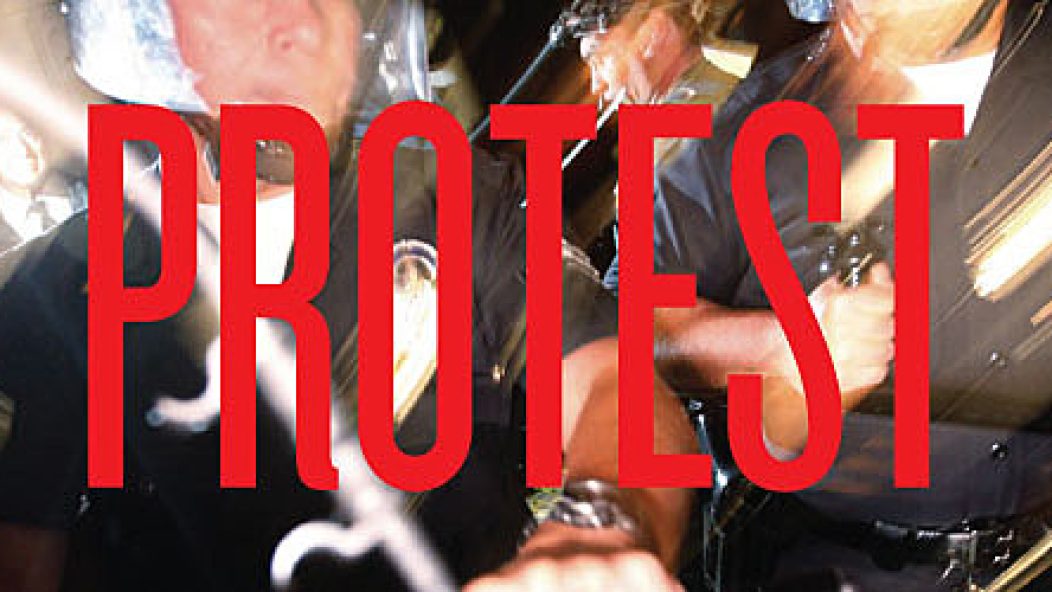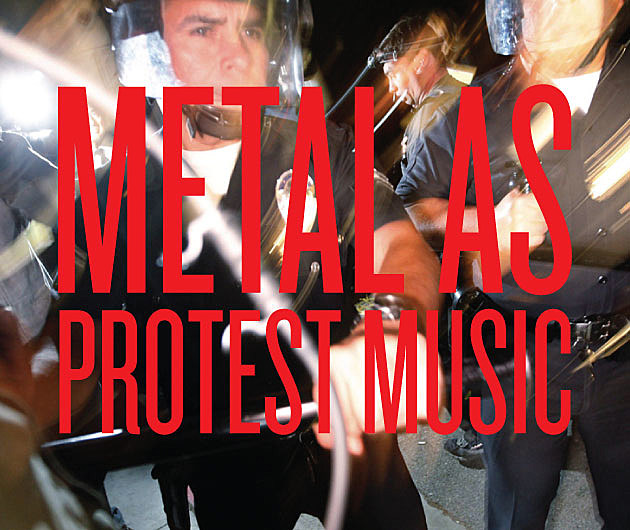
Metal as Protest Music
For the sake of this article, I’m going to define protest music as: songs whose lyrical content can be interpreted as political, and standing against some sort of established system of behavior, and which have been used to rally against said systems. People make political music into protest songs; artists do not write protest songs.
Metallic adjectives grew like weeds in Zuccotti Park, formerly Liberty Plaza Park, when I visited. Loud stands out: one can (or could, as of November 6, 2011) hear Occupy’s drum circle (I counted upwards of 50 individual drums) from two New York blocks away. Funny thing, though: The protest songs I heard at Occupy were, by and large, old music forged around previous protest movements: “Revolution” by The Beatles, “Rockin’ in the Free World” by Neil Young, “Exodus” by Bob Marley – no-one had the guts to play The Clash’s “White Riot”. Occupy is hard-pressed to find any modern music reflecting the movement’s mood, apparently.
That’s a problem. Music is a crucial element to protest – the anti-establishment folk of the 1960s civil rights and anti-Vietnam protests remains some of the most loved and critically acclaimed modern music. People still rip off Bob Dylan four decades after his prime, and I’m being generous when I use the word “prime”. Music, especially at high volume, attracts attention. It provides bite-sized mottoes for people to rally around. When associated with a subculture, it gives a protest movement an identifiable aesthetic identity.
I have issues with Occupy using protest music from Rock n’ Roll’s pinnacle. That the golden age of American protest in the 1960s, iconic as they remain, weren’t precisely successful – one in nine young black men in America is incarcerated, the country remains in two lengthy wars of occupation that dwarf Vietnam in almost every respect, and gay marriage is still under fire. The hippies lost, and the civil rights movement scored a technical knockout at best. Worse, music from that era has been co-opted by the kind of big business Occupy is supposed to stand against. “Revolution” was in a commercial. Rolling Stone magazine is sold in Rite Aids alongside Entertainment Weekly and People. Nostalgia sells overpriced greatest hits collections.
People need stronger protest music; heavy metal is a good choice. Metal music, on an ideological level, seeks to destroy establishments and conventions (at least conventions outside the realm of metal) more often than not. Disobedience, civil or not, is a pillar of the faith. Metal and extreme music in general (as well as Hip-hop, though that’s been co-opted as well) is evidence of rock’s shortcomings. This may seem like an elementary thought, but: if people were totally satisfied with rock, then metal, punk and hardcore would not have diverged from it. This is music full of strong and ugly emotions during a time of strong and ugly emotions. Unlike its ancestor and cousins, metal is, for the most part, too abrasive to be used as a marketing gimmick on the scale The Beatles have been–it is in a sense co-opt proof. And while metal may be entering its 40s, it has yet to take part in a social movement in the way folk-rock did in America, or punk did in the UK. Occupy is the most significant protest movement Western society has birthed in that same length of time.
Unfortunately, from my perspective, Occupy is unlikely to grab onto leather and denim any time soon: The movement’s organizers are doing their best to spread a nonviolent, squeaky-clean image. From the metalhead’s end of things, political bands and albums are often overshadowed by their more party-/gore-/Satan-/esoteric-/history-focused brethren. Still, metal has produced a wealth of strong political music rife to be made into protest anthems. Here are some choice cuts, some collected in albums, some standing alone.
Metallica – And Justice For All
. . .
http://www.youtube.com/watch?v=UfoDh1XL2wo&feature=youtu.be
Metallica – “And Justice For All”
. . .
http://www.youtube.com/watch?v=4oZPTlI3MEo&feature=youtu.be
Metallica – “The Shortest Straw”
. . .
“Halls of justice painted green, money talking / Power wolves beset your door, hear them stalking.” How is this album’s artwork not plastered and graffitied on every street corner with an Occupy tumblr? In a post-2008 world, with the possible Eurozone collapse (by most accounts a direct result of government and financial corruption) inhibiting the US’s economic recovery, this album sounds prophetic in retrospect. Cosmo’s in-depth discussion of this album supersedes my own.
Queensryche – “Revolution Calling”
. . .
Queensryche – “Spreading the Disease”
. . .
I listened to this record while driving to my local Occupy’s first day of hullabaloo. Operation: Mindcrime is still one of the most well-regarded metal records by the mainstream press, but the lion’s share of that acclaim is aimed at its amazing production and tight playing, not to mention being one of the only truly successful rock operas. In retrospect, the love story seems a bit trite and the narrative unresolved, but the social criticism is sharp as it ever was. Kudos to Queensryche for underscoring the threads of corruption tying evangelical Christianity, financiers and career politicians together. Paradoxically, you can also read the album as a cautionary tale about how dangerous it is too have too much faith in a charismatic leader.
http://www.youtube.com/watch?v=4lqa4tsg8rY&feature=youtu.be
Sepultura – “Refuse/Resist”
. . .
Sepultura – “Propaganda”
. . .
Chaos A.D. lacks some of its predecessor’s musical chops, but far exceeds it in lyrical content. Authentic lyrics and attitude are among the few benefits of surviving years in a police state. “Refuse/Resist” could be a rallying cry for any victim of police brutality. The rest of the album is in a similar vein. It’s worth noting that “Biotech is Godzilla” spat vitriol at biomedical companies long before doing so became ‘hip’. For further rallying cries, refer to “Propaganda” (“Don’t believe what you read”), and “Slave New World” (“We’re not slaves, we’re free”).
Lamb of God – “Ashes of the Wake”
. . .
Lamb of God – “Remorse Is For the Dead”
. . .
This band gets a nasty reputation from the metal underground as mainstream and knuckledragging. Evidence to the contrary: 2004’s Ashes of the Wake, proof that popularity is not (or was not) married to ignorance. Ashes is a 45-minute indictment of the Bush regime, and the surge of post 9-11 patriotism which fueled it. Blythe and co. call bullshit on nearly every facet of new-millennium America on this record, but the album comes together on the instrumental title track, with its chilling vocal diatribe courtesy of one disgruntled US Marine, before transitioning seamlessly into “Remorse is for the Dead”.
http://www.youtube.com/watch?v=dlkuyPDFhyo&feature=youtu.be
Slayer – “Jihad”
. . .
http://www.youtube.com/watch?v=e7itQO3i_SM&feature=youtu.be
Slayer – “Supremist”
. . .
If anyone who kills an American is a terrorist, then metal’s history of anti-religious sentiment has changed from blasphemy into a legitimate political dialogue. Appropriately, Slayer keyed into that on Christ Illusion. For the first time in over a decade, Slayer sounded convinced of their own music, instead of following a rote pattern. The results are savage: “Jihad” damns Islamic terrorists, but then the next song “Consfearacy” spits the same venom at the US government. Christ Illusion takes no prisoners.
Kreator – “Violent Revolution”
. . .
“Society’s failed to tolerate me / And I have failed to tolerate society.” That line elevates this track above other ‘fuck this and burn shit’ songs. “Violent Revolution” is all about being an outsider – that means metalheads, as well as everyone abandoned by the machinery of postmodernity.
http://www.youtube.com/watch?v=N89a2WvbJgs&feature=youtu.be
Skid Row – “Slave to the Grind”
. . .
Forget for a minute that Sebastian Bach hasn’t needed to work a dead-end job for no pay in decades. The ideal American is, apparently, a self-made person who propels him- or herself from the lower classes to a position of wealth and power on the merits of his or her own hard work alone. Do you know anyone like that? Me neither. Turns out you can’t be king of the world when you’re slave to the grind, after all.
http://www.youtube.com/watch?v=WTZyVymUjBI&feature=youtu.be
Ministry – “Thieves”
. . .
Al Jourgensen jumped on the Bush-hating bandwagon as well, and made some of the most violent music of his career at the same time. That said, as much as I like hearing clips of Dubya edited together into admissions of guilt, Jourgensen could have stopped with “Thieves”. (I’m embedding the live version from In Case You Didn’t Feel Like Showing Up, just because it’s one of my favorite live records.)
And finally…
Napalm Death – “When All Is Said and Done”
. . .
This should require no explanation. While their peers were making songs about slaughtering prostitutes, Napalm Death were talking about social injustice and the meaninglessness of a wage slave society – themes which have pervaded every album of theirs since Scum. Napalm Death say one thing to me: if modern life is meaningless, there is no point in sanity or even safety.
. . .












